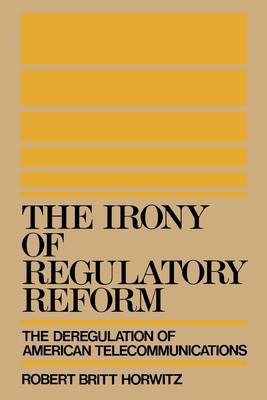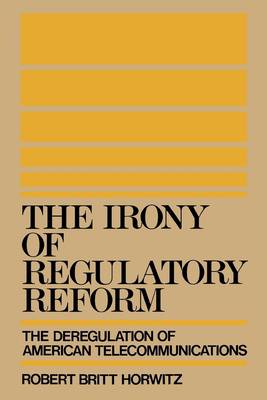
- Retrait gratuit dans votre magasin Club
- 7.000.000 titres dans notre catalogue
- Payer en toute sécurité
- Toujours un magasin près de chez vous
- Retrait gratuit dans votre magasin Club
- 7.000.000 titres dans notre catalogue
- Payer en toute sécurité
- Toujours un magasin près de chez vous
The Irony of Regulatory Reform
The Deregulation of American Telecommunications
Robert Britt Horwitz
Livre broché | Anglais
159,45 €
+ 318 points
Format
Description
Deregulation was a political buzzword of the early 1980's. The Reagan Administration came to power on a platform dedicated to getting government "off the backs of the people." Deregulation promised to lower inflation, raise productivity, and reverse the sagging fortunes of American industry. And proponents declared deregulation morally right because it constituted a rollback of the arbitrary power of the state in favor of individual initiative and liberty. But the actual politics of deregulation, including the momentous breakup of AT&T, had already turned out to be far more complex than this rhetoric suggested. In The Irony of Regulatory Reform Horwitz examines the history of telecommunications--both telephone and broadcast--to build a compelling new theory of regulation. Against the backdrop of modern theories of the state, he presents a sweeping survey of the history of regulation in America, delineating three distinct periods of regulatory genesis and, correspondingly, three discrete types of agencies. Horwitz shows the underlying irony that while anti-regulation rhetoric was aimed at the so-called "social" regulatory agencies, in practice it has been the "economic" agencies that have been deregulated, often with vehement opposition from the industries affected. Within the context of this broader theory, telecommunications is a fascinating industry to study, because it determines the character of our marketplace of ideas, because it has been an arena of great technological transformation, and because of its fundamental role in anchoring the so-called "information age." Horwitz unveils the complex mosaic of forces--economic, political, legal, and technological--that undermined the traditional regulation of telecommunications and precipitated deregulation.
Spécifications
Parties prenantes
- Auteur(s) :
- Editeur:
Contenu
- Nombre de pages :
- 424
- Langue:
- Anglais
Caractéristiques
- EAN:
- 9780195069990
- Date de parution :
- 21-03-91
- Format:
- Livre broché
- Format numérique:
- Trade paperback (VS)
- Dimensions :
- 157 mm x 234 mm
- Poids :
- 594 g







